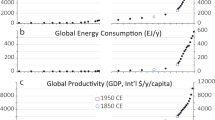Abstract
IN the autumn of the year 1814, towards the end of the Napoleonic drama, a travelling coach wended its way southwards over the picturesque mountain roads of the Austrian Tyrol. Its three occupants were the celebrated Sir Humphry Davy, his haughty wife, and a modest young man who played the part of a scientific assistant, and also, but with suppressed reluctance, that of valet. Waterfalls thundered down into the valleys, and the eyes of the young man followed them in wonderment. What were his thoughts? Deeply religious by nature and upbringing, was he simply admiring the works of the Almighty, or had he a glimmering presentiment of the possibility of harnessing these vast sources of energy for the benefit of mankind, to the realisation of which his later discoveries were to supply the key?
This is a preview of subscription content, access via your institution
Access options
Subscribe to this journal
Receive 51 print issues and online access
$199.00 per year
only $3.90 per issue
Buy this article
- Purchase on Springer Link
- Instant access to full article PDF
Prices may be subject to local taxes which are calculated during checkout
Similar content being viewed by others
Author information
Authors and Affiliations
Rights and permissions
About this article
Cite this article
PRZIBRAM, K. Faraday and Austria*. Nature 128, 351–352 (1931). https://doi.org/10.1038/128351a0
Issue Date:
DOI: https://doi.org/10.1038/128351a0
Comments
By submitting a comment you agree to abide by our Terms and Community Guidelines. If you find something abusive or that does not comply with our terms or guidelines please flag it as inappropriate.



